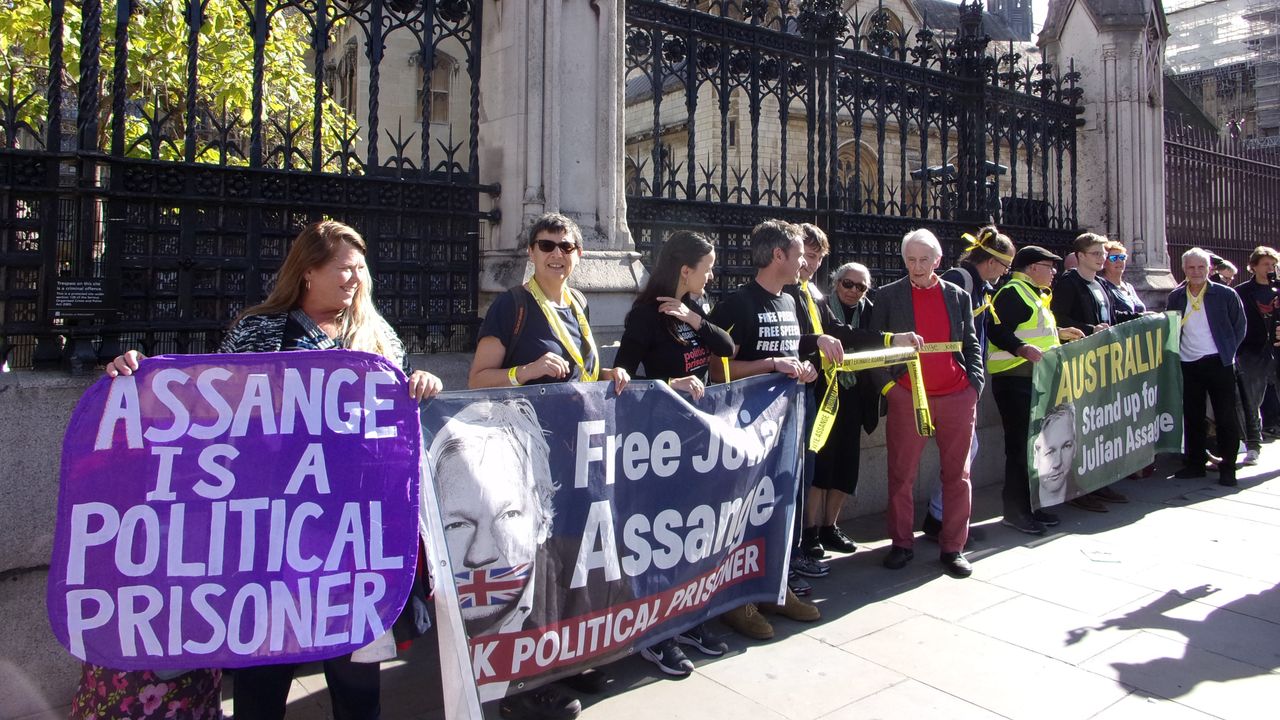-
7,000 form human chain in London to protest treatment of Assange

Around 7,000 people formed a human chain around the Houses of Parliament in the UK Saturday, protesting the British government’s persecution of WikiLeaks founder Julian Assange.
The chain ran continuously from Parliament Square along the Palace of Westminster, across Lambeth Bridge, along South Bank to Westminster bridge, then back over the Thames river to Parliament Square—roughly two miles. The event was organised by the Don’t Extradite Assange campaign.
Assange is currently held in Belmarsh maximum security prison in London. The United States government is seeking his extradition under the Espionage Act for exposing the war crimes and human rights abuses of US imperialism and its allies. It has plotted his assassination and levelled charges which carry a life sentence in solitary confinement. The WikiLeaks founder is seeking to overturn orders by the British judiciary and the home secretary approving his extradition. His legal team filed an appeal with the High Court in August.
Stella Assange, the WikiLeaks publisher’s wife, told protestors on Saturday, “Julian is suffering and part of the point of making this human chain was to show that what is happening here is not a legal process, it’s not a legitimate process. It is the instrumentalisation of the law in order to persecute a person, a journalist, in order to keep him in prison indefinitely.
Julian Assange's wife, Stella Assange, addresses protestors outside the High Court in London, October 27, 2021. [AP Photo/Frank Augstein]
“People around the world are witnessing this atrocity and that is what compels them to come here to show their solidarity, to show that they care about Julian. That they believe in justice, that they see what is happening here is a state that has committed crimes against innocent, that is now committing crimes against a journalist who exposed those crimes they committed.
“Let’s not forget that the US planned to assassinate Julian in the UK, while he was in the embassy and now they’ve put him in the harshest prison in the UK for almost four years.”
WikiLeaks editor Kristinn Hrafnsson said proceedings against Assange were “not a legal case,” because of the way the legal system has “bent itself to the demands and requests of the government… it’s appalling.”
He continued, “Julian is a political prisoner. He's being politically persecuted. The chain around Parliament is sending a message to those inside. They are there to serve the people on the outside. And those are Julian’s supporters. Thousands of them here today, and millions around the world who know that this is a travesty.”
Labour MP and former shadow chancellor John McDonnell had the brass neck to announce, “As we go into the 18 months up to a general election, this will become a general election issue. Every MP will be asked: do you stand up for journalism, do you stand up for the rights of journalist to report freely, do you stand up for his basic human rights, do you stand up for justice?”
McDonnell was attending with his close ally Jeremy Corbyn, who deliberately kept silent on Assange throughout the 2017 and 2019 general elections when he was Labour leader, despite being confronted over the issue. Corbyn was asked, “do you stand up for journalism?” and refused. So did McDonnell. They conspired to prevent Assange’s case becoming “a general election issue”. Only now that they have been reduced to impotence—McDonnell on Labour’s backbenches, Corbyn expelled from the parliamentary Labour Party, do they raise the call for a campaign.
Reporters from the World Socialist Web Site spoke with some of the protestors.
Nigel, who works in construction, explained Assange’s work was important because “Government are lying to people, trying to trample on the world. How many people’s deaths are enough for the money—that’s what it boils down to. And freedom of speech. Locking people up for telling the truth is criminal in itself.
Nigel protesting for Assange outside Parliament, Saturday, October 8, 2022 [Photo: WSWS]
“It’s not just about one man. This is about the world. The world should be looking after each other, and not trampling on each other all the time. Governments shouldn’t be looking out for big business and industries: they should be looking out for the people – that is their job, and they are failing massively in that.
Nigel said he thought the cost-of living crisis was helping energise the Assange campaign: “People are starting to question why they’re struggling so much. It’s a massive problem and it’s going to get worse.”
Asked about the international situation and the danger of war, he said, “They go into whatever country they feel like, destroy it with a war or proxy war and rebuild it to suit them. They can then take every commodity from that country. In the rebuilding, they give the contracts to themselves. The arms industry make the first bit of the money, other industries afterwards, Then all the resources of those countries go back to the United States, or to Britain, we’re not squeaky clean in this.
“This is what’s happening with Ukraine. America has been in there for a long time winding the Ukrainians up to do their dirty work. And the main people who are going to lose on that are the Ukrainians. And the rest of Europe, because America has its sights on Europe. It wants Europe because it’s a good market, particularly gas and energy after the Nord Stream pipeline has been blown up.”
Nigel said the Americans were responsible for the sabotage: “The Russians aren’t going to blow up their own pipeline are they when they can switch it off. The mainstream media don’t talk about any of this. You’ve got to look deeper.”
A number of those protesting travelled to London from other countries to do so. Mantas, who traveled from Lithuania that day to support Assange as part of the chain, told our reporters, “Assange told the truth about war crimes, and he fought for human rights and freedom of the press.”
Mantas protesting for Assange outside Parliament, Saturday, October 8, 2022 [Photo: WSWS] The US and UK governments “want to make a clear and obvious example of Assange so that no-one attempts what he did. The powers that be are trying to impose their own world view, control how people think, to seduce them into thinking nothing can be done or that the world is as it’s supposed to be, when we are actually entering into wholesale madness in the world.”
He said of the war in Ukraine that the weapons manufacturers and businesses “want to promote a new war, and they don’t care about the consequences for the Ukrainian people or the Russian people. I don’t agree with Putin’s actions, but I think there was another option, but Zelensky was encouraged to take a hard line and oppose any deals from the Russian Federation.”
Mantas said of an anti-war movement, “The seeds are growing. There is hope.”
Another young worker described how Assange had “exposed what our governments are doing in our name. We need to be aware of what’s really going on and he helped to uncover that. No one responsible for the crimes he exposed has been prosecuted, but he has. They’re basically shooting the messenger. And people need to know that.”
A young worker protesting for Assange outside Parliament, Saturday, October 8, 2022 [Photo: WSWS] Listing the crimes exposed by WikiLeaks he said, “Where do you start? You can look at the video of an Apache helicopter shooting civilians. The Afghan and Iraq war logs and so on. People should look into it. There’s too much to go into herethat many crimes have been uncovered. People should look into what WikiLeaks has done what its expose and be objective about the matter.”
Assange’s case “shows that if anyone finds out something like this and tries to tell the public then they can be prosecuted for it. So obviously that can threaten everyone.”
Speaking about the war in Ukraine, he said, he was concerned just as much about Palestine. “I don’t just think the big bad scary Russians are a problem. It’s any world power that’s causing problems in the world.” Britain, he added, was “not a force for good” in the world.
Jenny, a retired teacher, said Assange’s case was “clearly unjust, clearly impinges on our rights to hear what has happened.” She continued, “From the establishment’s point of view, [it’s important to] keep all this nasty information tucked away, and that’s what made him a particular target.”
Retired teacher Jenny protesting for Assange outside Parliament, Saturday, October 8, 2022 [Photo: WSWS] Jenny drew a comparison between the slandering of Assange and the anti-democratic campaign against left-wing members in the Labour Party: “The really heavy guns were brought out, and then there was all of this rubbish about him [Labour leader Jeremy Corbyn] being a spy.
“And then they found traction with the anti-Semitism campaign, which was so ridiculous that you wouldn’t believe it was being tried, but it worked. It was a very emotive issue. In that particular issue, I think it was particularly vile. By using anti-Semitism as a weapon, it was being anti-Semitic. The number of Jewish people who have suffered, who were accused and were kicked out the labour party… it was a particularly vile aspect.”
Discussing the fight for socialism and an anti-war movement, Jenny said, “I think that it’s going to be a long struggle, but we have to take every opportunity. If a revolution erupted tomorrow, I’d get behind it.”


Login or Register to Leave a Comment